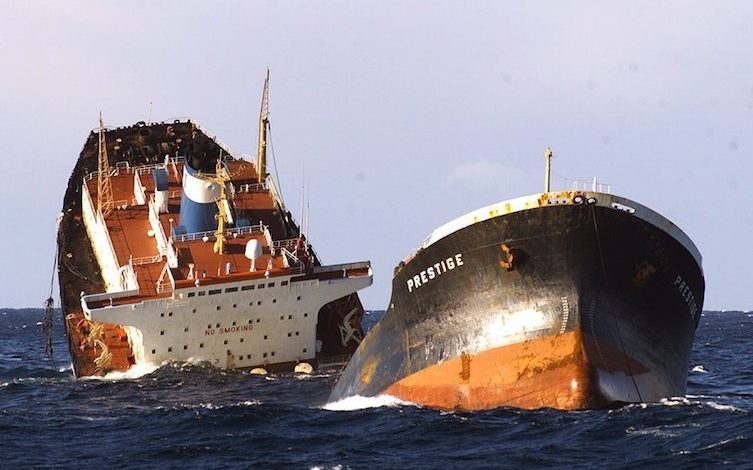London Club hit with $1bn Prestige fine

The London Steam-Ship Owners’ Mutual Insurance Association (The London Club) is urgently looking for clarification from the Spanish judicial system having yesterday been whacked with a $1bn bill over the 2002 Prestige oil spill.
A court in La Coruña has said that the P&I Club must pay the huge sum as part of a multi-billion dollar damages settlement.
The court awarded Spain $1.9bn in damages for the oil spill while also granting $2.1bn in compensation to the region of Galicia and $72m to France.
“The London Club remain concerned at the direction that the Spanish Court has taken generally, including in respect of the international CLC Convention. The London Club look forward to clarification of and the opportunity to study the findings in more detail before making further comment,” a spokesperson for the British insurer said.
The Prestige tanker was one of the most high profile sinkings in Europe in recent years, splitting in two off the coast of northern Spain and polluting thousands of kilometres of coastline with a 60,000 ton spill.
Mare Shipping, the ship’s owner and the International Oil Pollution Compensation Funds, have also been hit with massive penalties as has the ship’s Greek captain, who controversially was given a two-year jail term in 2016 for his role in the disaster.

Those knowledgeable of the publicly available chain of events that ultimately led to this maritime casualty would add in context that the vessel was refused a place of refuge by the Spanish in addition to France and Portugal. The Greek Minister for Mercantile Marine at the time has been repeatedly quoted as saying “The ship did not sink by itself. They (sic: the Spanish Authorities) sank it”.
The Spanish court’s ruling against the London Club has everything to do with Spanish politics and nothing to do with the independent rule of law and Spain’s longstanding ratification of both the Civil Liability Convention (CLC) and the FUND Convention. These two conventions provide for shipowner strict liability and a combined compensation regime funded by both ship owners and their P&I Clubs as well as oil cargo receivers. The CLC also provides a right of direct action against the owner’s P&I Club which was never before entitled under the P&I ‘paid to be paid’ rule. The trade off to the Clubs and the FUND was to be entitled to establish a upper limit of liability based on the GT of the offending tanker. In short, a pragmatic solution devised at the IMO to deal with catastrophic events. Now the Spanish Government would like to toss the CLC and the FUND Conventions into the bin because the limits legally imposed came up short of the total damage claims awarded. How ridiculous. I look forward to reading the Spanish court’s findings and the reasoning behind such a bizarre decision. Will they argue that their government did not read the fine print in the relevant Conventions before they signed? Or that the master’s alleged criminality entitles them to break limitation? Anything seems possible from a country that arguably caused the Prestige disaster by first refusing her master’s pleas for entry to a port of refuge and then, when she sank and spewed oil on their beaches, jailing him and finding him guilty of a crime he did not commit so as to cover up their own incompetence.
What happened to the responsibilities of the flag state and classification society?
Nothing has happened to the responsibilities of flag states and class. However, flag states are effectively immune from liability to 3rd parties and the courts of the US, England and most other countries have held that – on public policy grounds – class societies (when performing their statutory/RO role) are not liable either. Shipowners are liable under the CLC for oil cargo and bunker spills. However, the CLC ’92 (amended 2003) sets a maximum shipowner/P&I upper limit of SDR 90 million (approx USD 130 million). Once this amount is absorbed, the FUND ’92 and Sup FUND 2003 take over up to a max limit to contributing cargo receivers of SDR 750 (approx USD 1 billion). If this total amount is fully absorbed, then that is the end of it and any shortfall must be absorbed by 3rd party claimants and their own insurers. Yes, the
basic legal fundamentals of complete restitution for harm caused are impacted. But Spain and all other countries that ratify the oil pollution conventions know this and should take out excess of loss insurance to cover such eventualities. What is unfair or unjust about such a transparent and pragmatic arrangement?